
APPLIED ECOLOGY AND ENVIRONMENTAL RESEARCH
Scope & Guideline
Innovating solutions for a sustainable future.
Introduction
Aims and Scopes
- Ecological Dynamics and Interactions:
Research on the interactions between organisms and their environments, including studies on population dynamics, community structure, and ecosystem functions. - Soil and Water Management:
Investigation into soil health, nutrient cycling, and water resource management, emphasizing sustainable agricultural practices and the impact of various treatments on soil quality. - Biodiversity and Conservation:
Exploration of biodiversity patterns, conservation strategies, and the ecological impacts of human activities, including studies on invasive species and habitat restoration. - Environmental Pollution and Remediation:
Assessment of pollutants in various ecosystems, focusing on heavy metal contamination, pesticide impacts, and bioremediation techniques to mitigate environmental damage. - Climate Change Effects:
Analysis of climate change impacts on ecosystems and species distribution, with an emphasis on adaptive strategies and resilience in natural systems. - Agroecology and Sustainable Agriculture:
Research promoting sustainable agricultural practices, including the use of organic fertilizers, crop rotation, and the role of plant growth-promoting bacteria.
Trending and Emerging
- Climate Resilience and Adaptation:
Increasing research on how ecosystems adapt to climate change, focusing on resilience strategies and the role of biodiversity in maintaining ecosystem functions. - Microbial Ecology and Bioremediation:
A growing emphasis on the role of microbial communities in bioremediation processes and soil health, highlighting the potential of microbial solutions for environmental restoration. - Sustainable Agricultural Practices:
A surge in studies promoting agroecological practices, including the use of biochar, organic amendments, and integrated pest management to enhance agricultural sustainability. - Ecological Impact Assessments:
An increase in research assessing the ecological impacts of anthropogenic activities, particularly in urban and peri-urban environments, reflecting a broader concern for ecosystem services. - Restoration Ecology:
Emerging themes in the restoration of degraded ecosystems, with a focus on methodologies that enhance biodiversity and ecosystem functionality.
Declining or Waning
- Traditional Chemical Agriculture Practices:
There has been a noticeable decline in research centered on conventional chemical agriculture as more studies focus on sustainable practices and organic farming methods. - Invasive Species Management:
Research specifically targeting invasive species management strategies has decreased, possibly as attention shifts towards broader ecological interactions and holistic management approaches. - Static Biodiversity Assessments:
Studies that solely catalog biodiversity without addressing ecological interactions or functional aspects are becoming less common, as more integrative approaches gain popularity.
Similar Journals

Soil Ecology Letters
Unlocking the Secrets of Soil EcosystemsSoil Ecology Letters, published by SpringerNature, is a premier journal dedicated to advancing the knowledge and understanding of soil ecosystems, their functions, and their vital role in global sustainability. Since its inception in 2019, this leading journal has consistently maintained its prestigious Q1 ranking in Ecology, Evolution, Behavior and Systematics, as well as Soil Science, reflecting its significant impact in the ecological and environmental sciences community. With an impressive Scopus ranking that places it within the top percentile of journals in its field, Soil Ecology Letters provides a platform for researchers and professionals to disseminate their groundbreaking findings. The journal is a vital resource for advancing research in agricultural and biological sciences, offering open access options that promote widespread dissemination of knowledge. With its focus on fostering collaboration and innovation in soil ecology, this journal is essential reading for anyone aiming to deepen their understanding of soil environments and their critical role in ecological health.
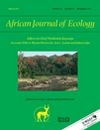
AFRICAN JOURNAL OF ECOLOGY
Championing Groundbreaking Research in African EcologyThe African Journal of Ecology, published by Wiley, is a leading academic journal in the field of Ecology, Evolution, Behavior, and Systematics. Established in 1963 and continuing its vital contributions to the field until 2024, this journal serves as a premier platform for researchers and scholars to share groundbreaking studies that explore the intricate relationships within ecosystems, particularly in the African context. With an impressive Scopus Rank of #423 out of 721 and a Q3 Quartile ranking, it stands as a credible source of scholarly information, gaining recognition among peers for its rigorous peer-review process and impactful publications. While the journal is not open access, it remains influential in driving advancements in ecological research and providing insights vital for conservation efforts and biodiversity studies. Authors and readers alike will find that the African Journal of Ecology not only promotes scientific inquiry but also fosters a deeper understanding of ecological dynamics that affect our world.
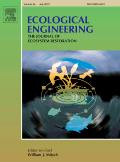
ECOLOGICAL ENGINEERING
Connecting research and practice for a sustainable world.ECOLOGICAL ENGINEERING, published by Elsevier in the Netherlands, is a leading journal dedicated to advancing the field of environmental engineering and sustainable development. With an impressive impact factor and recognized as Q1 in multiple categories including Environmental Engineering, Management, Monitoring, Policy and Law, as well as Nature and Landscape Conservation, this journal stands at the forefront of environmental science research. It ranks among the top publications in its fields according to Scopus, reinforcing its significance with a notable position within the 90th percentile for Nature and Landscape Conservation. ECOLOGICAL ENGINEERING encourages open discourse and dissemination of innovative practices aimed at addressing contemporary ecological challenges, making it an essential resource for researchers, professionals, and students committed to sustainable practices and environmental stewardship. The journal’s comprehensive scope includes ecological restoration, habitat management, and policy implementation, ensuring a broad spectrum of relevant topics for its readership.

Inland Water Biology
Connecting Research with Freshwater ConservationInland Water Biology is a distinguished peer-reviewed journal published by MAIK NAUKA/INTERPERIODICA/SPRINGER, focusing on the intricate interactions within freshwater ecosystems. With its ISSN (1995-0829) and E-ISSN (1995-0837), this journal has established itself as an essential resource for researchers and professionals in the fields of Aquatic Science and Ecology, evidenced by its consistent ranking in the Q3 category for both disciplines in 2023. Covering a wide array of topics related to the biology of inland waters, the journal aims to disseminate cutting-edge research findings and theoretical advancements that contribute to the understanding of aquatic environments and their ecological significance. Although it does not offer open access, its impact in the academic community is noteworthy, ensuring that published works undergo rigorous peer review. Researchers, professionals, and students alike will find valuable insights and innovative approaches within its pages, making Inland Water Biology a vital addition to their academic endeavors.

Ecologia Aplicada
Transforming Ecological Knowledge into Action.Ecologia Aplicada is a premier academic journal dedicated to advancing the understanding and application of ecological principles in varied environmental contexts. Published by UNIV NACIONAL AGRARIA LA MOLINA, the journal boasts a commitment to disseminating high-quality research that bridges the gap between theoretical concepts and practical applications in ecology, thereby contributing to sustainable development and environmental conservation practices in Latin America and beyond. With the ISSN 1726-2216 and E-ISSN 1993-9507, Ecologia Aplicada provides a platform for researchers, professionals, and students to publish and access impactful studies that address pressing ecological challenges. While the journal follows a rigorous editorial process, it is particularly notable for its Open Access initiatives, which aim to enhance the availability of crucial ecological research. The journal plays a vital role in enriching the academic community's discourse on ecological issues, encouraging innovative methodologies, and fostering collaborative approaches to ecological problem-solving.

Folia Oecologica
Fostering Innovation in Agricultural and Biological Sciences.Folia Oecologica is a distinguished open-access journal published by WALTER DE GRUYTER GMBH, focusing on critical research in the fields of agricultural and biological sciences, ecology, and forestry. Established as a vital platform for the dissemination of knowledge, this journal has been providing free access to its valuable content since 2017, catering to an international audience engaged in environmental and ecological studies. With its ISSN 1336-5266 and E-ISSN 1338-7014, Folia Oecologica has earned notable ranks in Scopus, placing it in the 62nd percentile for Agricultural and Biological Sciences and the 50th percentile for Environmental Science. The journal's commitment to high-quality research is reflected in its positions in the Q2 and Q3 quartiles across various categories in 2023. As it converges years from 2006 to 2024, Folia Oecologica continues to foster scholarly dialogue and collaboration among researchers, professionals, and students, making significant contributions to the understanding and preservation of our ecological systems.
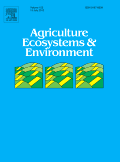
AGRICULTURE ECOSYSTEMS & ENVIRONMENT
Pioneering Insights in Ecosystem Management and AgronomyAGRICULTURE ECOSYSTEMS & ENVIRONMENT is a premier journal published by Elsevier, specializing in the fields of agronomy, animal science, and ecology. With an impressive impact factor reflective of its stature, it ranks in the top quartile (Q1) across three significant categories, highlighting its critical role in advancing research within the agricultural and environmental sciences. The journal serves as a vital platform for disseminating high-quality research that addresses the complex interactions between agriculture and ecosystems, providing insightful methodologies and findings that inform sustainable practices. As the journal continues to converge from 1983 and through to 2025, it remains committed to offering both traditional and innovative access options while contributing to the academic community's understanding of pressing environmental challenges. Researchers, professionals, and students are encouraged to engage with the journal's comprehensive content, which is positioned among the elite in its fields, having achieved top rankings in Scopus across relevant disciplines.
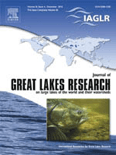
JOURNAL OF GREAT LAKES RESEARCH
Shaping Environmental Policies through Cutting-Edge ResearchJOURNAL OF GREAT LAKES RESEARCH is a prestigious academic journal published by Elsevier Science Ltd, focused on the vital field of aquatic sciences and ecology. With a long-standing history since its inception in 1975, this journal proudly ranks in the Q1 quartile across multiple categories, including Aquatic Science and Ecology, as of 2023, reflecting its significant contribution to the scientific community. The journal's impact is underscored by its impressive Scopus rankings, placing it within the top percentile of scholarly publications in related disciplines. Although it operates under a subscription model, its influence extends globally, serving as a critical resource for researchers and professionals dedicated to understanding the Great Lakes ecosystem and its broader ecological implications. As it converges into its future publications through 2024, JOURNAL OF GREAT LAKES RESEARCH remains an essential platform for innovative research that shapes environmental policy and promotes sustainable practices in aquatic environments.
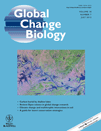
GLOBAL CHANGE BIOLOGY
Innovating Research for a Sustainable PlanetGLOBAL CHANGE BIOLOGY, published by Wiley, is a leading journal dedicated to advancing the scientific understanding of the relationships between biological systems and global environmental changes. With an impressive impact factor placing it in the Q1 category across multiple disciplines—including Ecology, Environmental Chemistry, and Global and Planetary Change—this journal is essential for researchers, professionals, and students aiming to stay at the forefront of this dynamic field. The journal has a rich history since its inception in 1995, continually providing a platform for high-quality research that informs policy and management practices worldwide. Although it is not open access, the journal remains a valuable resource for those committed to exploring the complexities of ecological and environmental change. With a Scopus ranking of #3 in Global and Planetary Change and #6 in both Ecology and Environmental Chemistry, GLOBAL CHANGE BIOLOGY continues to shape the dialogue on the pressing environmental challenges of our time.
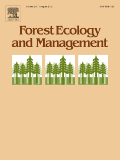
FOREST ECOLOGY AND MANAGEMENT
Fostering Sustainable Solutions for Global ForestsFOREST ECOLOGY AND MANAGEMENT is a premier peer-reviewed journal dedicated to the integral study of forest ecosystems and their management, published by Elsevier in the Netherlands. With an impactful presence in the field, this journal boasts a prestigious Q1 ranking in multiple categories, including Forestry, Management, Monitoring, Policy and Law, and Nature and Landscape Conservation as of 2023. It addresses key issues relevant to sustainable forest practices, conservation strategies, and environmental monitoring, making it a vital resource for researchers, practitioners, and policymakers alike. The journal is indexed with an impressive Scopus rank, placing it among the top tier of titles in Agricultural and Biological Sciences and Environmental Science. While it does not offer Open Access options, its rigorous review process and high visibility make it essential for those seeking to stay abreast of the latest findings and trends in forest ecology and management. Published continuously since 1976, FOREST ECOLOGY AND MANAGEMENT aims to foster interdisciplinary collaboration and advance knowledge critical to the stewardship of forest resources in an ever-changing global landscape.